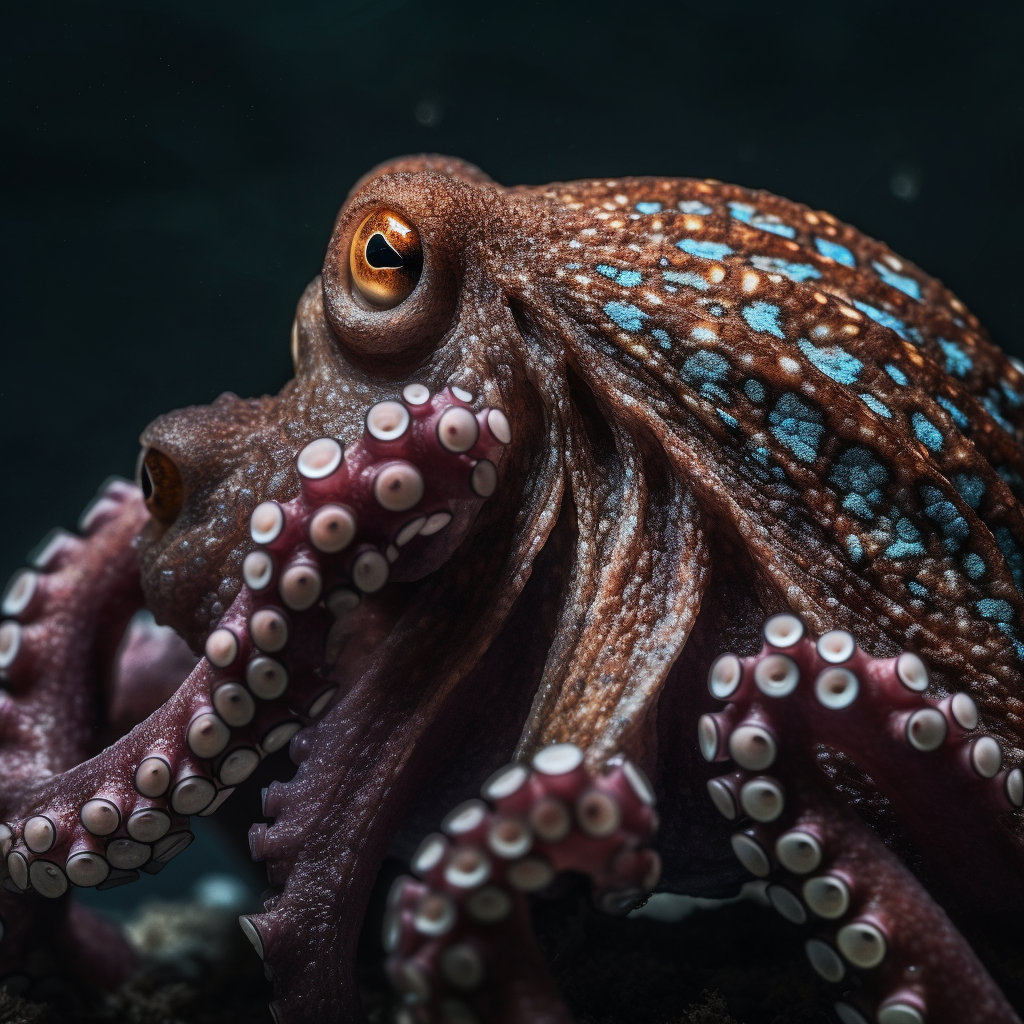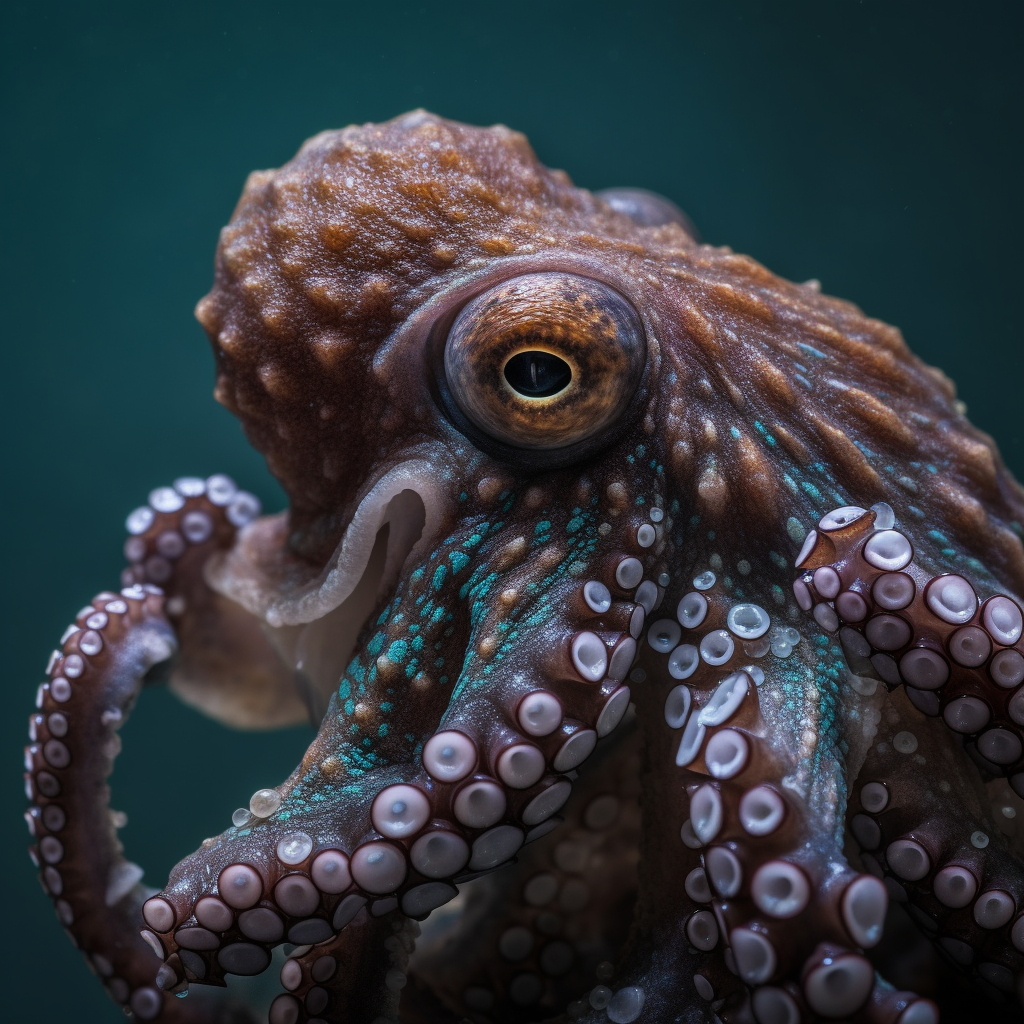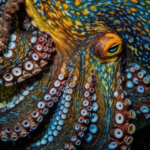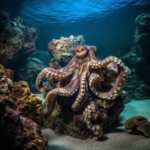Dolphins are fascinating creatures known for their intelligence and playful nature. They inhabit oceans all around the world and have a diverse diet that includes fish, squid, and even octopuses. In this article, we will explore the intriguing question: do dolphins eat octopuses? We will delve into the feeding habits of dolphins, their interactions with octopuses, and the strategies they employ to catch these elusive cephalopods. So, let’s dive in and discover more about the relationship between dolphins and octopuses!
Key Takeaways
- Dolphins are known to eat octopuses as part of their diet.
- Dolphins use their intelligence and agility to catch and consume octopuses.
- Octopuses are a valuable source of nutrients for dolphins.
- The hunting techniques used by dolphins to catch octopuses can vary depending on the species and location.
The Dolphin Diet: An Overview

When it comes to the diet of dolphins, these intelligent marine creatures have a diverse range of food sources. Dolphins are known to be opportunistic feeders, meaning they adapt their diet based on the availability of prey in their habitat. Let’s take a closer look at what dolphins generally eat, the role of squid in their diet, and whether they consume jellyfish and lobster.
A. What Do Dolphins Generally Eat?
Dolphins are carnivorous creatures, which means their diet primarily consists of meat. The specific species of dolphins and their habitat play a significant role in determining their food preferences. While some species of dolphins primarily feed on fish, others have a more varied diet that includes squid, octopuses, and even small marine mammals like seals.
Dolphins are skilled hunters and have developed various techniques to catch their prey. They often work together in groups, known as pods, to corral and capture fish. This cooperative hunting behavior allows them to maximize their chances of success.
B. The Role of Squid in a Dolphin’s Diet
Squid is a crucial part of a dolphin’s diet, especially for certain species like the common dolphin and the bottlenose dolphin. Squid provides dolphins with a rich source of nutrients and is readily available in many oceanic regions.
Dolphins have evolved specialized teeth and jaws that allow them to grasp and consume squid efficiently. They use their sharp teeth to tear apart the squid‘s body, and their strong jaws help them break through the tough outer skin. This adaptation enables dolphins to extract the maximum nutritional value from their prey.
C. Do Dolphins Eat Jellyfish and Lobster?
While dolphins are known to consume a variety of marine creatures, including fish and squid, their interaction with jellyfish and lobster is not as common. Jellyfish can be challenging for dolphins to eat due to their gelatinous and slippery nature. However, some species of dolphins, like the spinner dolphin, have been observed feeding on jellyfish.
As for lobsters, they are not a typical part of a dolphin’s diet. Dolphins have been known to interact with lobsters, but they are not a significant food source for these marine mammals.
It’s important to note that the diet of dolphins can vary based on factors such as their habitat, the availability of prey, and the specific species of dolphin. Researchers continue to study the feeding habits of dolphins to gain a better understanding of their dietary preferences and the role they play in the marine ecosystem.
In conclusion, while dolphins generally consume fish and squid, their diet can also include octopuses, jellyfish, and even small marine mammals. The specific food sources of dolphins depend on their species and habitat. By studying their feeding behavior, scientists can gain valuable insights into the complex relationships between marine predators and their prey.
The Intriguing Case of Dolphins and Octopuses

A. Do Dolphins Eat Octopuses?
Dolphins are fascinating creatures known for their intelligence and playful nature. They inhabit oceans and seas all around the world, captivating the attention of marine enthusiasts and researchers alike. One question that often arises is whether dolphins eat octopuses. Let’s delve into this intriguing topic and find out.
Dolphins are opportunistic predators, meaning they will eat a variety of prey depending on their habitat and availability. While their diet primarily consists of fish, it is not uncommon for dolphins to consume other marine creatures, including octopuses. Octopuses are known for their remarkable intelligence and ability to camouflage, making them a challenging prey for many predators, including dolphins.
B. Which Dolphins Eat Octopus and Where?
Various dolphin species have been observed consuming octopuses. One such species is the bottlenose dolphin, which is found in oceans and seas worldwide. These dolphins have been observed hunting and consuming octopuses in different parts of the world, including the Mediterranean Sea, the Atlantic Ocean, and the Pacific Ocean.
Spinner dolphins, another species known for their acrobatic displays, have also been observed feeding on octopuses. These dolphins are commonly found in tropical and subtropical waters, such as the Hawaiian Islands and the Red Sea.
C. How Often Do Dolphins Eat Octopus?
The frequency of dolphins consuming octopuses can vary depending on several factors, including the availability of other prey species and the specific habitat in which the dolphins reside. While octopuses may not be the primary food source for dolphins, there have been documented cases of dolphins actively hunting and consuming these cephalopods.
It is important to note that dolphins are highly adaptable and opportunistic hunters. They have been observed using various hunting techniques to catch their prey, including cooperative hunting strategies. When it comes to octopuses, dolphins may employ different tactics to overcome the octopus’s defense mechanisms, such as their ability to change color and shape.
In conclusion, while dolphins primarily feed on fish, they are known to eat octopuses as well. The specific dolphin species and their habitat play a significant role in determining the frequency of octopus consumption. The interaction between dolphins and octopuses is a fascinating aspect of marine predator-prey relationships, highlighting the complexity of aquatic ecosystems and the survival strategies of different sea creatures.
The Art of Dolphin Feeding

A. How Do Dolphins Eat Their Food?
Dolphins are highly intelligent and adaptable creatures that have developed unique feeding strategies to survive in their marine habitats. They are known to consume a wide variety of prey, including fish, squid, and even octopuses. But how do dolphins eat their food?
-
Hunting Techniques: Dolphins employ a range of hunting techniques depending on the type of prey they are targeting. For example, when hunting fish, they often work together in coordinated groups called pods to corral their prey into tight balls. This makes it easier for them to capture multiple fish at once.
-
Echolocation: Dolphins have an incredible ability called echolocation, which allows them to locate and identify their prey using sound waves. They emit a series of clicks and listen for the echoes that bounce back to them. This helps them determine the size, shape, and location of their prey, making it easier to catch.
-
Speed and Agility: Dolphins are incredibly fast swimmers, capable of reaching speeds of up to 20 miles per hour. This speed and agility give them an advantage when chasing down their prey, allowing them to quickly close in and make a successful capture.
-
Teeth and Jaw Structure: Dolphins have sharp, conical teeth that are well-suited for grasping and holding onto slippery prey. Their jaw structure allows them to grip their food securely while they tear it into smaller, more manageable pieces.
B. The Unique Way Dolphins Eat Octopus
When it comes to eating octopuses, dolphins have developed a unique strategy to overcome the challenges posed by these intelligent and elusive creatures.
-
Octopus Defense Mechanisms: Octopuses are known for their ability to defend themselves using various tactics, such as camouflage, ink release, and even jet propulsion to escape from predators. However, dolphins have found a way to outsmart these defense mechanisms.
-
Shaking and Tossing: Dolphins have been observed shaking and tossing octopuses in the water to disorient them and prevent them from using their camouflage or ink release as a defense. This behavior helps the dolphins gain the upper hand and makes it easier for them to consume their prey.
-
Tearing Apart: Once the octopus is subdued, dolphins use their sharp teeth and powerful jaws to tear it apart into smaller, more manageable pieces. This allows them to consume the octopus more efficiently and reduces the risk of injury from the octopus’s beak, which can be quite sharp and dangerous.
-
Avoiding Poisonous Parts: Some species of octopuses, such as the blue-ringed octopus, are venomous and can pose a threat to predators. Dolphins have been observed avoiding the poisonous parts of the octopus, such as the beak and venomous glands, while consuming the rest of the body.
C. Can Dolphins Eat Squid and Octopus in the Same Way?
While dolphins do consume both squid and octopus, their feeding strategies may differ slightly depending on the specific species and size of the prey.
-
Squid: Squid are fast-moving and agile creatures, making them a challenging prey for dolphins. When hunting squid, dolphins often use their speed and agility to chase down and capture their prey. They may also employ similar techniques used for catching fish, such as herding them into tight groups before making a coordinated attack.
-
Octopus: As mentioned earlier, dolphins have developed a unique strategy for consuming octopuses. This involves shaking and tossing the octopus to disorient it, tearing it apart into smaller pieces, and avoiding the poisonous parts. This strategy may not be as effective when hunting squid, as they have different defense mechanisms and body structures.
In conclusion, dolphins are skilled hunters that have adapted their feeding strategies to consume a variety of prey, including octopuses and squid. Their intelligence, speed, and agility give them an advantage when hunting these elusive creatures. By understanding how dolphins eat their food, we can gain a deeper appreciation for their role in marine ecosystems and the fascinating interactions between predators and prey in the ocean.
The Risks and Rewards of Eating Octopus
A. Why Do Dolphins Choose to Eat Octopus?
Dolphins are known for their diverse diet, which includes a wide range of marine creatures. While they are often associated with eating fish, dolphins also have a taste for octopuses. But why do dolphins choose to eat these elusive creatures?
-
Nutritional Value: Octopuses are a rich source of nutrients for dolphins. They are high in protein, which is essential for the growth and maintenance of the dolphins’ bodies. Additionally, octopuses contain important minerals and vitamins that contribute to the overall health of these marine mammals.
-
Variety in Diet: Dolphins are intelligent creatures that thrive on variety in their diet. By including octopuses in their menu, dolphins can diversify their food sources and ensure they are getting a balanced diet. This adaptability is crucial for their survival in different marine environments.
-
Hunting Challenge: Octopuses are known for their intelligence and ability to camouflage, making them a challenging prey for dolphins. Dolphins are highly skilled hunters and enjoy the thrill of the chase. The pursuit and capture of an octopus can provide mental and physical stimulation for dolphins, keeping their hunting instincts sharp.
B. The Dangers of Eating Octopus for Dolphins
While dolphins may find octopuses to be a rewarding meal, there are also risks associated with consuming these cephalopods.
-
Defense Mechanisms: Octopuses have several defense mechanisms that can pose a threat to dolphins. When threatened, they can release ink to create a cloud of confusion, allowing them to escape. Some octopuses also have sharp beaks that can inflict injuries on predators. Dolphins need to be cautious while hunting octopuses to avoid harm.
-
Toxicity: Certain species of octopuses produce toxins as a defense mechanism. These toxins can be harmful or even fatal to dolphins if ingested in large quantities. Dolphins have developed strategies to mitigate this risk, such as avoiding toxic species or consuming only specific parts of the octopus that are safe to eat.
C. How Dolphins Mitigate Risks While Eating Octopus
Dolphins have evolved various strategies to minimize the risks associated with eating octopuses.
-
Techniques and Skills: Dolphins have honed their hunting techniques to increase their chances of success while minimizing the risks involved. They use their echolocation abilities to locate and track octopuses, making it easier to plan their attacks. Dolphins also employ cooperative hunting strategies, where they work together to corner and capture their prey, reducing the chances of injury.
-
Selective Consumption: Dolphins are selective in what parts of the octopus they consume. They may avoid the toxic parts or remove them before consuming the rest of the octopus. This allows them to enjoy the nutritional benefits of the prey while minimizing the potential harm from toxins.
In conclusion, while there are risks associated with eating octopuses, dolphins have developed strategies to mitigate these dangers. The nutritional value and hunting challenge provided by octopuses make them an attractive prey choice for dolphins. By adapting their hunting techniques and being selective in their consumption, dolphins can enjoy the rewards of including octopuses in their diet while minimizing the potential risks.
The Curious Case of Dolphins Eating Their Own
A. Do Dolphins Eat Their Babies?
Dolphins are known for their intelligence and playful nature, but there is a dark side to their behavior that has puzzled scientists for years. One of the most shocking behaviors observed in dolphins is infanticide, where adult dolphins kill and sometimes even eat their own babies. This behavior is not common among all dolphin species, but it has been observed in certain populations.
Infanticide in dolphins is a rare phenomenon, but it has been documented in several species, including bottlenose dolphins and killer whales. While it may seem shocking and cruel, there are several theories as to why dolphins engage in such behavior.
B. Why Would Dolphins Engage in Such Behavior?
There are several theories that attempt to explain why dolphins engage in infanticide. One theory suggests that it is a result of competition for resources. In some dolphin populations, food can be scarce, and the presence of a new calf may threaten the survival of other individuals. By eliminating the competition, the adult dolphins increase their own chances of survival.
Another theory suggests that infanticide is a way for male dolphins to gain reproductive opportunities. In some dolphin species, males will kill the offspring of females they are not related to in order to bring the females back into estrus, or a state of sexual receptivity. This allows the males to mate with the females and increase their own chances of passing on their genes.
It’s important to note that not all dolphins engage in infanticide. It is a behavior that is observed in certain populations and is not representative of all dolphin species. Dolphins are highly social animals, and their behavior can vary depending on factors such as habitat, diet, and social structure.
C. The Impact of This Behavior on Dolphin Populations
While infanticide may seem like a brutal behavior, it is important to understand its impact on dolphin populations. In some cases, infanticide can actually benefit the population as a whole. By eliminating weak or sick offspring, adult dolphins ensure that only the strongest and healthiest individuals survive. This can lead to a stronger and more resilient population in the long run.
However, infanticide can also have negative consequences. If a population experiences a high rate of infanticide, it can lead to a decline in the number of individuals and a decrease in genetic diversity. This can make the population more vulnerable to environmental changes and other threats.
Understanding the reasons behind infanticide in dolphins is crucial for conservation efforts. By studying this behavior, scientists can gain insights into the complex social dynamics of dolphin populations and develop strategies to protect and preserve these fascinating creatures.
In conclusion, while infanticide in dolphins is a shocking and disturbing behavior, it is not representative of all dolphin species. It is a complex phenomenon that can be influenced by various factors such as competition for resources and reproductive opportunities. By studying and understanding this behavior, scientists can work towards better conservation and management of dolphin populations.
The Role of Hunting in Dolphin Feeding
Dolphins are highly intelligent and social creatures that inhabit various aquatic ecosystems around the world. They are known for their diverse diet, which includes a wide range of prey such as fish, squid, and even octopuses. In this section, we will explore the fascinating role of hunting in dolphin feeding, including their hunting tactics for octopus and squid, as well as the potential variations in hunting methods among different dolphin species.
A. How Do Dolphins Hunt for Their Food?
Dolphins employ a variety of hunting techniques to capture their prey. These techniques often depend on the specific prey they are targeting and the environmental conditions in which they are hunting. One common hunting method used by dolphins is known as “herding.” In this technique, dolphins work together as a team to corral a school of fish or a group of squid into a tight cluster, making it easier for them to catch their prey.
Another hunting strategy employed by dolphins is called “sonar hunting.” Dolphins have an exceptional ability to use echolocation, which involves emitting clicks and listening for the echoes to determine the location and size of their prey. By using this sonar system, dolphins can accurately locate and track their prey, even in murky or dark waters.
B. The Hunting Tactics for Octopus and Squid
When it comes to hunting octopuses and squid, dolphins must employ different tactics due to the unique defense mechanisms of these creatures. Octopuses, for example, are known for their ability to camouflage themselves by changing the color and texture of their skin. This makes them incredibly difficult to spot, even for the highly perceptive dolphins.
To overcome this challenge, dolphins often rely on their agility and speed. They will chase the octopus, using their superior swimming abilities to outmaneuver the elusive creature. Once the dolphin has cornered the octopus, it may use its snout or flippers to stun or disorient the prey before consuming it.
Squid, on the other hand, have a different set of defense mechanisms. Some species of squid can release ink clouds as a means of escape, creating a smokescreen that confuses predators. Dolphins have been observed using their echolocation to track the squid even when they are hidden within these ink clouds. Once the dolphin has located the squid, it will use its sharp teeth to capture and consume its prey.
C. Do Hunting Methods Vary Among Different Dolphin Species?
While dolphins share similar hunting techniques, there may be variations in their hunting methods among different species. Factors such as habitat, prey availability, and social structure can influence the hunting behavior of dolphins.
For example, spinner dolphins, known for their acrobatic spinning leaps, have been observed using a hunting technique called “bubble net feeding.” This involves a group of dolphins swimming in a circle around a school of fish, blowing bubbles as they swim. The bubbles create a barrier that traps the fish, making it easier for the dolphins to catch their prey.
In contrast, bottlenose dolphins, one of the most well-known dolphin species, often use a combination of herding and individual hunting techniques. They are skilled at working together to herd fish into shallow waters or against a shoreline, where they can easily catch their prey.
In conclusion, hunting plays a crucial role in dolphin feeding. Dolphins employ a range of hunting tactics, including herding and sonar hunting, to capture their prey. When it comes to octopuses and squid, dolphins must adapt their hunting strategies to overcome the unique defense mechanisms of these creatures. While there may be variations in hunting methods among different dolphin species, they all share a remarkable ability to navigate their aquatic environments and secure their food sources. Conclusion
In conclusion, dolphins are known to be highly intelligent and adaptable creatures that have a diverse diet. While they primarily feed on fish and squid, they have been observed eating octopuses as well. Dolphins have developed unique hunting techniques to catch and consume octopuses, such as shaking them vigorously to break their limbs and make them easier to swallow. Despite the challenges posed by the octopus’s defense mechanisms, dolphins have proven to be skilled predators in their pursuit of this elusive prey. The relationship between dolphins and octopuses is a fascinating example of the complex interactions that occur in the marine ecosystem. As we continue to study and learn more about these incredible creatures, we gain a deeper appreciation for the diversity and intricacies of life in the ocean.
Frequently Asked Questions
How do dolphins eat octopus?
Dolphins have a unique hunting technique for eating octopuses. They use their strong jaws to break the octopus into pieces, which prevents the octopus from using its suction cups as a defense mechanism. This is a key part of the marine predator-prey relationship in aquatic ecosystems.
What dolphins eat octopus?
Most species of dolphins are known to eat octopus, including the common bottlenose dolphin. This is part of their diverse diet which also includes fish and squid. This showcases the variety in dolphin food sources.
Why do dolphins eat their babies?
This is a misconception. Dolphins do not eat their babies. However, male dolphins can sometimes be aggressive towards young dolphins due to competition or social dynamics, which may be mistaken as predation.
Where do dolphins eat?
Dolphins eat in the ocean, where they hunt for their food. They can be found feeding in various parts of the aquatic ecosystem, from the surface to the seafloor, depending on the availability of their prey.
How often do octopus eat?
Octopuses typically eat several times a day, depending on the availability of food. Their diet mainly consists of crabs, shrimp, and small fish. In the oceanic food chain, octopuses are both predators and prey.
Why do dolphins eat fish and squid?
Dolphins eat fish and squid because these are abundant food sources in their marine environment. This diet provides them with the necessary nutrients and energy to sustain their active lifestyles.
Can dolphins eat squid?
Yes, dolphins can and do eat squid. Squid is a common part of a dolphin’s diet, along with fish and other sea creatures. This is part of the diverse marine life feeding habits of dolphins.
How do dolphins eat their food?
Dolphins use their sharp teeth to catch and hold their prey but they do not chew. Instead, they swallow their food whole or in large chunks. This is a key part of dolphin feeding behavior.
Do all dolphins eat octopus?
While not all dolphins eat octopus, many species do. This includes the common bottlenose dolphin and the Pacific white-sided dolphin. Octopus is part of the sea creatures diet that dolphins consume.
Will dolphins eat octopus?
Yes, dolphins will eat octopus. Dolphins are known to be opportunistic feeders and will consume a wide variety of marine life, including octopus. This is a testament to the diverse diet of dolphins and the complex interactions within aquatic ecosystems.




